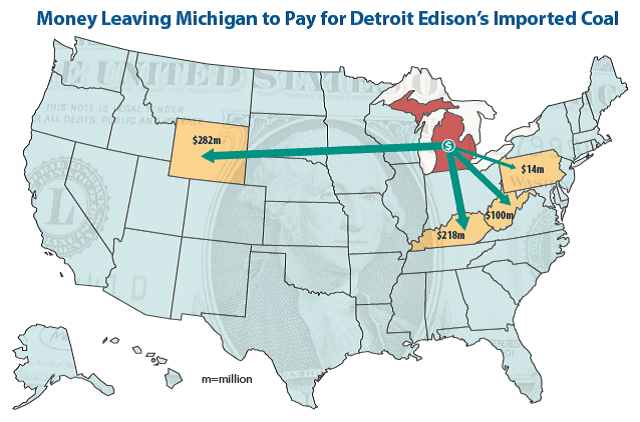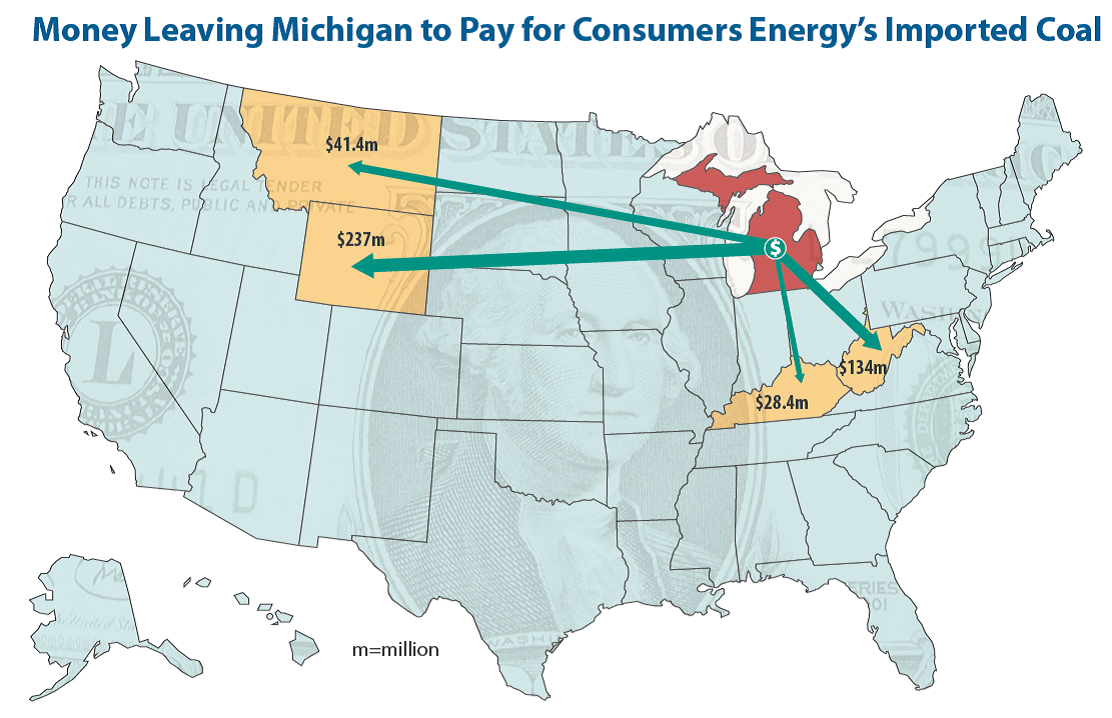Michigan’s two largest electric service providers—Detroit Edison and Consumers Energy—seem to prefer sending billions of ratepayer dollars out of state to pay for coal imports rather than investing more in homegrown renewable energy that will provide help to the local economy. Michigan voters will get an opportunity to change that this November by supporting Prop 3, a ballot initiative that would require the state to get 25 percent of its power from renewable energy sources like the wind and sun by 2025.
This is part of a series on Proposal 3: The Michigan Renewable Energy Ballot Initiative.
An unhealthy dependence on (out-of-state) coal
Michigan is home to one of the oldest and least efficient coal power plant fleets in the nation: 87 percent of the state’s coal capacity exceeds the typical 30-year design lifespan of a coal facility, and nearly a third began operation more than 50 years ago. Most also lack essential modern pollution controls, causing significant harm to public health and the environment. Collectively, these coal power facilities account for nearly 60 percent of Michigan’s power generation. Detroit Edison depends on coal for more than three-quarters of its electricity supply.

Michigan has excellent potential for developing in-state wind power and other renewable energy resources, which can help reduce the state’s dependence on imported coal while creating jobs and other economic benefits. Photo source: Alex Gorzen
Despite Michigan utilities’ heavy dependence on coal, there are no in-state coal resources to draw on. Instead, coal power producers must import every speck of coal they burn each year from places like West Virginia, Kentucky, and as far away as Wyoming. This cost of importing the coal—which comes directly out of the pockets of ratepayers—is a drain on Michigan’s economy.
A new UCS analysis reveals exactly how much money Michigan’s largest utilities are sending out of state to import coal. In 2010, Detroit Edison sent more than $615 million out of Michigan—nearly half the state’s total expenditures on coal imports, and more than any other Michigan power producer. Consumers Energy, Michigan’s second largest power provider, spent $441 million on coal imports—more than a third of the state’s total expenditures. All Michigan power producers collectively paid nearly $1.3 billion to import coal in 2010.

Detroit Edison, the state’s largest power provider, sent $615 million out of Michigan in 2010 to pay for the coal its power plants burned.

Consumers Energy, the state’s second largest power provider, sent $441 million out of Michigan in 2010 to pay for the coal its power plants burned.
This isn’t a new trend. Michigan utilities have been sending ratepayer money out of state to import coal for decades. And the toll adds up quickly over time. From 2002 to 2010, cumulative purchases of imported coal reached nearly $10.4 billion. More than half of this total—$5.4 billion—was spent by Detroit Edison, and about 30 percent—$3.2 billion—was spent by Consumers Energy. Further exacerbating the situation is the fact that coal prices have significantly increased over time. The price that Detroit Edison paid for coal increased 81 percent from 2002 to 2010. And during those same years the price Consumers Energy paid for coal increased by a whopping 119 percent.
Homegrown renewables can boost the local economy
So how can Michigan reduce its dependence on imported coal and keep more energy dollars in the local economy? Investing in homegrown renewable energy is one smart and effective path forward. Renewable energy development can help stimulate the economy by redirecting funds into local economic development—funds that would otherwise leave the state. Michigan has a wealth of renewable energy resources like wind, solar, and bioenergy; yet these resources supplied just 3.8 percent in 2011.
Michigan utilities are already required by state law to produce at least 10 percent of the state’s power needs from renewable energy by 2015; but the state can reap significant benefits from doing more. This November, Michigan voters will be able to vote on Prop 3, a ballot initiative to boost the state’s renewable energy requirement to 25 percent by 2025. Doing so would spur innovation, spark $10 billion in new investment, and create thousands of Michigan based jobs.
Instead of embracing the opportunity to transition Michigan to a clean energy economy, both Detroit Edison and Consumers Energy are regrettably opposed to Prop 3. They apparently would rather keep their ratepayers dependent on importing coal to burn in their old and polluting coal plants. But increasing renewables in Michigan to 25 percent by 2025 is an achievable goal that will curb coal use, protect public health and the environment, and help keep more energy dollars local. In fact, achieving a 25 percent renewable energy standard could help keep as much as $2 billion from leaving the state to import coal cumulatively from 2016 (the year Prop 3 would take effect) through 2025. That is good news for all Michiganders.
